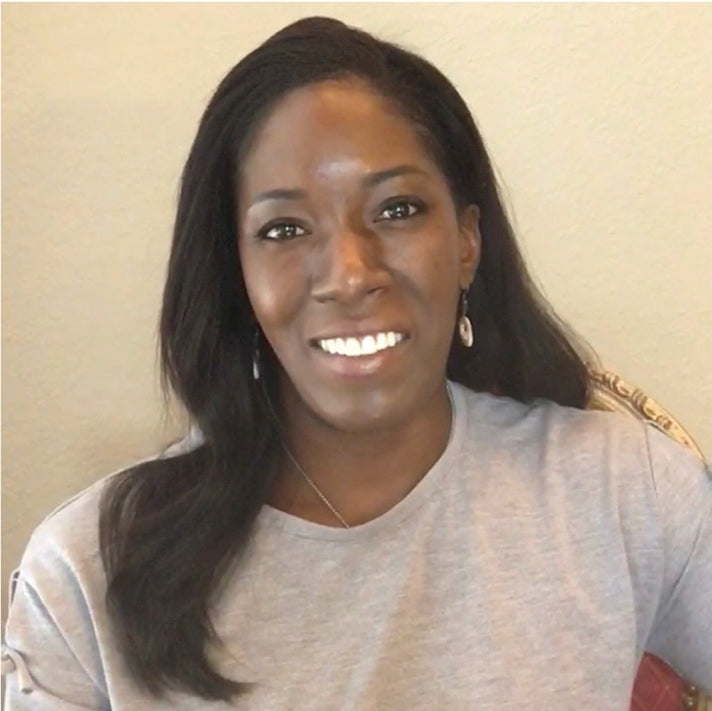Build a healthy relationship with money (so that it doesn’t always have to be about the money). Look at your numbers, examine the stories and beliefs you tell yourself about your value, commit to incremental savings, and come into financial alignment. To listen to the full interview with Chioma Njoku, tune in to Home Practice with Halle: Yoga Tools for Every Body on your favorite podcast platform. For more information on Chioma’s work, follow @mindfullychioma or check out her services at The Mindful Bookkeeper.
Halle: Hi everyone. I am joined today by long-time yoga practitioner, yoga teacher, accountant, and the founder of The Mindful Bookkeeper, Chioma Njoku. Chioma, welcome! Your service, The Mindful Bookkeeper, is rooted in helping service-based businesses like yoga studios increase their profits by connecting their “why” to their finances. Can you tell us a little bit about your journey, and how you came to do this work?
Chioma: The very summarized version has been the journey of realizing that the mind, and the emotions around money, are just as important as the skill. I am a trained accountant with a master’s degree in Accounting and an MBA. I even once ran an Accounting Department and still lived paycheck-to-paycheck. What I often thought was that I wasn’t making enough. What I realized later was that this was conditioned behavior of the emotions related to money. I thought that I had hit the glass ceiling. I also felt like I wasn’t doing my part to contribute to society. I shifted into being a yoga teacher, which is when I started to hear way too much money talk. “Making money isn’t yoga-like." "You’re all about the money." "You should charge low fees or no fees.” I completely forgot my objective in why I wanted to become a teacher. Eventually, I started doing what I do now, which is helping others have that healthy relationship with money so that it’s not always about the money—it’s about doing what you love and making a difference.
Halle: I appreciate that you brought up the idea that making money, or making a living teaching yoga, is somehow antithetical to yoga itself. How have you overcome that? Do you work with clients who believe that?
Chioma: The latter question, yes. When I do work with clients, part of the work together is to over-come that. Without that healthy relationship to money, you won’t budget. We will find ways to get rid of that money. We are not conscious of it, and are like “Hmm, where’d the money go?” In terms of me, I had to meet myself where I was. I’m an accountant, so of course I went to skill-based books. My game-changer was a book called Profit First, which put a system and a structure in place. This book showed me how to organize my finances. My lightbulb moment was that for the thirteen years I was in corporate, I never paid attention to how creative one can be with organizing finances. It took me pretty much being stripped of everything to finally see that I could tailor my finances to myself. This book showed me that I could move a percentage of money from my checking to savings first before paying my bills. I started with moving just 1%. I’d get paid, move 1% over to my savings account, and that was the process. From there, I started to encounter my emotions like, “How did I get here? Why did I get here? Why are other people here?”
Halle: It sounds like awareness and incremental savings are great first steps. What other steps are necessary in changing your relationship to money?
Chioma: It’s really important to become aware of your surroundings, which includes what you consume on the news or any TV program, what you see on Instagram, what you read, the friends you have, what they talk about and how they say it. If you start to pay attention to the money language that we hear all the time… like, I watch Real Housewives of whatever, no shame in saying that [laughs] and it offers such great lessons on what not to do! There are episodes in which they make fun of the practical “housewife,” for throwing their child a pizza party. They were like, “Why didn’t you bring ponies, or shut down streets?” What that showed me is that TV is programming us to have expectations of how we should handle our finances. That’s one example—become aware of the stories you are being told about money. I like to journal, that is another step. Ask yourself, “What beliefs do you have about money?” And be very honest. When you put the pen to paper, the thoughts just start flowing, and therefore you’ll read what you really believe and recognize your subconscious programming. Whatever you are aware of you can change. Become aware of your thoughts and become aware of your surroundings—start with those two things.
Halle: Do you get objections from clients who are like, “What I know about money is that I don’t even have enough of it to really make a difference.” What is the first step when it might feel very challenging to make a living? Is the first step is just saying, “I can make money”? Do you think mindset makes that much of a difference?
Chioma: It does. When you first say, “I can make money,” you probably won’t believe it. But the first step is the willingness to step into a new result. And then second step is, “Do you look at your numbers?” The answer is often, “No, I’m afraid.” It’s really about proving to yourself where the money is flowing. You are in control of how your cash flows in and flows out. We allow people, things, and circumstances to have us believe that we are not in control, but we are. Become aware of the beliefs that encourage your actions. It is work, but it’s not that difficult to change.
Halle: What are some concrete, accessible ways for a yoga teacher or yoga business to take ownership over their finances?
Chioma: We mentioned incremental savings, like saving 1% from each paycheck, unemployment check, or income from your business before paying bills. The 1% is daunting for some people. If you don’t believe you have money to save, no matter what I say, you won’t take that next step. But you aren’t going to miss three dollars, or twenty dollars per month. Then, look at your bank accounts. Reconnect with your money. In budgeting, the thing about trying to cut coffees and dinners is that when we only focus on coffees and dinners, we are not talking about the other things that are truly leaking your cash. We’re ignoring the late fees, or the late payments. We’re ignoring the 60 other streaming devices that we’re paying for right now during COVID. We are ignoring the students or clients that didn’t pay us, or did pay, but there was a tech glitch, and the money didn’t transfer. Instead of focusing on just cutting the coffees and the dinners, take it a step further—see where your money is actually going. Develop an expectation for your money. I don’t know why it’s a thing for a yoga teacher to have this “broke” right-of-passage. We have to be firm and confident in what we want and in our needs. There is so much judgement out there about being greedy and materialistic, and we need to let that go. Gratitude is very expansive, and it brings more opportunities to you.
Halle: Many individuals in the yoga and wellness industry open yoga studios because they love yoga and want to help people— but they may not have much business experience. What are some common pitfalls you see when you start working with business clients?
Chioma: I see a lot of free and discounts. Free and discounts are not a bad thing when used appropriately, but what happens is that studio owners and yoga teachers project a scarcity mindset onto their students. My business clients have admitted that they trained their community to only purchase class packages around Black Friday, and to always look for that discount. Clients have confessed that they didn’t believe their work was valuable, and that they thought the only way to get people in the door was to discount it or make it free.
Halle: Can you walk us through the process of connecting your “why” to your finances?
Chioma: I simply ask, “Why are you in business?” Often times, I don’t get a clear answer. Which is okay—it’s a good place to start, and its honest. At that point, I’ve had a good look at their numbers, and I tell them, “I can tell you don’t know because there is no consistency in your expenses." And then I ask them a few questions, “Do you know why you’re spending money on, for example, Mail Chimp (the e-mail platform)?” And they don’t know, or they’ve heard that this is what they should use. I ask, “Do you know why you use Mind Body?” And they say, “I don’t know, everyone else is using it.” Money has to circulate. The money goes out to serve, and we have to re-frame what each expense is for. This exercise helps clients get into their why. The main question is, “Why do your students come to you?” And if they don’t know, I say, “Ask! That’s a good place to start.” When you look at your numbers, make sure that everything, cash and expense-wise, supports why you are serving. And when we start to get to that point, it’s when the magic really happens.
Halle: What resources can you recommend for those looking to build their money-management skill set?
Chioma: A few skill-based books that I would like to recommend are Profit First by Mike Michalowicz, Dave Ramsey’s Complete Guide to Money, Ramit Sethi’s I Will Teach You to Be Rich, and I have to throw out our former presidential candidate Elizabeth Warren—she and her daughter wrote All Your Worth: The Ultimate Lifetime Money Plan. One more shoutout for the Aussies, I highly recommend the Scott Pape’s The Barefoot Investor.

Contributed By: Halle Miroglotta








